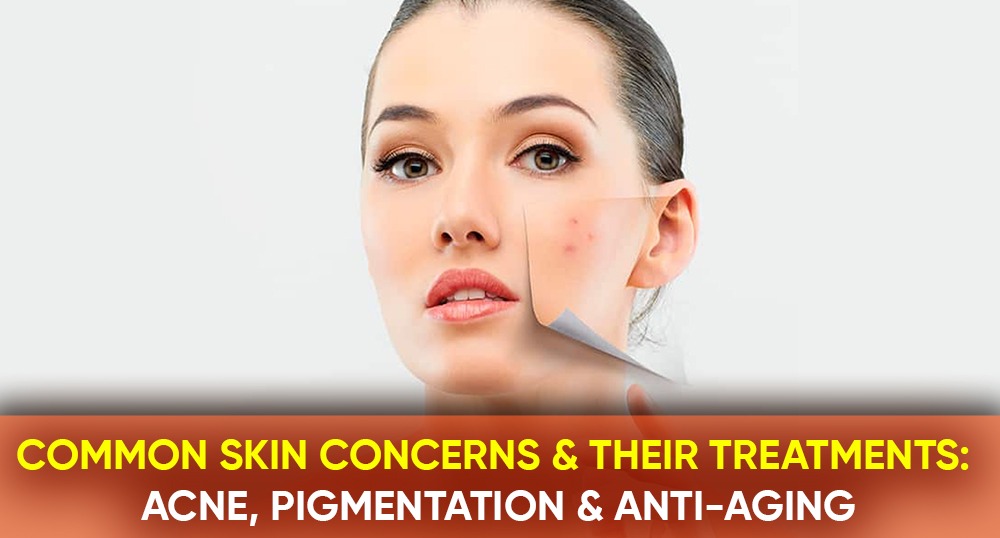Having flawless, healthy-looking skin is a common desire for many people, regardless of gender or age. However, achieving that goal can be a challenge, as various factors such as genetics, lifestyle, and environmental factors can affect our skin’s health and appearance. Three of the most common skin concerns that people face are acne, pigmentation, and signs of ageing. In this blog, we will discuss these concerns and explore effective treatments that can help you achieve clearer, brighter, and younger-looking skin.
Acne
Acne is a common skin condition that affects people of all ages but is most prevalent among teenagers and young adults. It occurs when hair follicles become clogged with oil and dead skin cells, leading to the formation of pimples, blackheads, and whiteheads. In addition to its physical effects, acne can also have a significant impact on one’s self-esteem and confidence, particularly when it is severe.
The good news is that there are many treatments available to help manage acne and improve the appearance of the skin. Here are some common approaches:
- Topical treatments: Over-the-counter or prescription creams, gels, and lotions containing benzoyl peroxide, salicylic acid, or retinoids can help unclog pores, reduce inflammation, and control bacterial growth.
- Oral medications: In severe cases, doctors may prescribe oral antibiotics or isotretinoin to help reduce inflammation and prevent scarring.
- Professional treatments: Chemical peels, microdermabrasion, and light therapy can help exfoliate the skin, unclog pores, and reduce the appearance of acne scars.
- Lifestyle changes: Maintaining a healthy diet, getting enough sleep, and managing stress can also help reduce acne breakouts.
Pigmentation
Pigmentation refers to the uneven distribution of melanin, the pigment that gives our skin its colour. It can occur due to various factors, including sun exposure, hormonal changes, and genetics. Pigmentation can manifest in different ways, such as freckles, age spots, and melasma, which is a patchy brown discolouration that commonly affects women during pregnancy.
Here are some treatments that can help reduce pigmentation and brighten the skin:
- Topical treatments: Over-the-counter or prescription creams containing hydroquinone, retinoids, vitamin C, and niacinamide can help reduce pigmentation and promote skin cell turnover.
- Chemical peels: A dermatologist can perform a chemical peel, which involves applying a solution containing alpha or beta hydroxy acids to the skin to exfoliate and remove pigmented cells.
- Laser and light therapy: Intense pulsed light (IPL) and fractional laser treatments can help reduce pigmentation by targeting melanin in the skin.
- Sun protection: Wearing sunscreen with a high SPF and avoiding direct sun exposure can help prevent further pigmentation.
Anti-Aging
As we age, our skin undergoes various changes that can contribute to the development of fine lines, wrinkles, and loss of firmness and elasticity. These changes are due to a combination of factors, including a decrease in collagen and elastin production, exposure to UV radiation, and lifestyle habits such as smoking and poor diet.
Fortunately, there are numerous treatments available that can help reduce the signs of aging and promote smoother, more youthful-looking skin:
- Topical treatments: Anti-aging creams and serums containing retinoids, hyaluronic acid, and antioxidants can help promote collagen production, reduce the appearance of fine lines and wrinkles, and hydrate the skin.
- Injectable treatments: Botox and dermal fillers can help smooth out wrinkles and restore volume to the face.
- Laser and light therapy: Fractional laser treatments and intense pulsed light therapy can help stimulate collagen production and reduce the appearance of wrinkles and fine lines.
- Microneedling: A dermatologist can perform microneedling, which involves creating tiny punctures in the skin to stimulate collagen production and improve skin texture and tone.
- Lifestyle changes: Adopting a healthy lifestyle, such as eating a balanced diet, staying hydrated, getting enough sleep, and avoiding smoking and excessive alcohol consumption, can help improve the overall health and appearance of the skin.
Conclusion
In conclusion, acne, pigmentation, and signs of ageing are common skin concerns that can affect people of all ages and backgrounds. Fortunately, there are many effective treatments available to help manage these concerns and achieve clearer, brighter, and younger-looking skin. Whether you prefer topical treatments, professional procedures, or lifestyle changes, it is important to consult with a dermatologist to determine the best approach for your specific needs and skin type. By taking good care of your skin and addressing any concerns early on, you can enjoy healthy, radiant skin for years.

